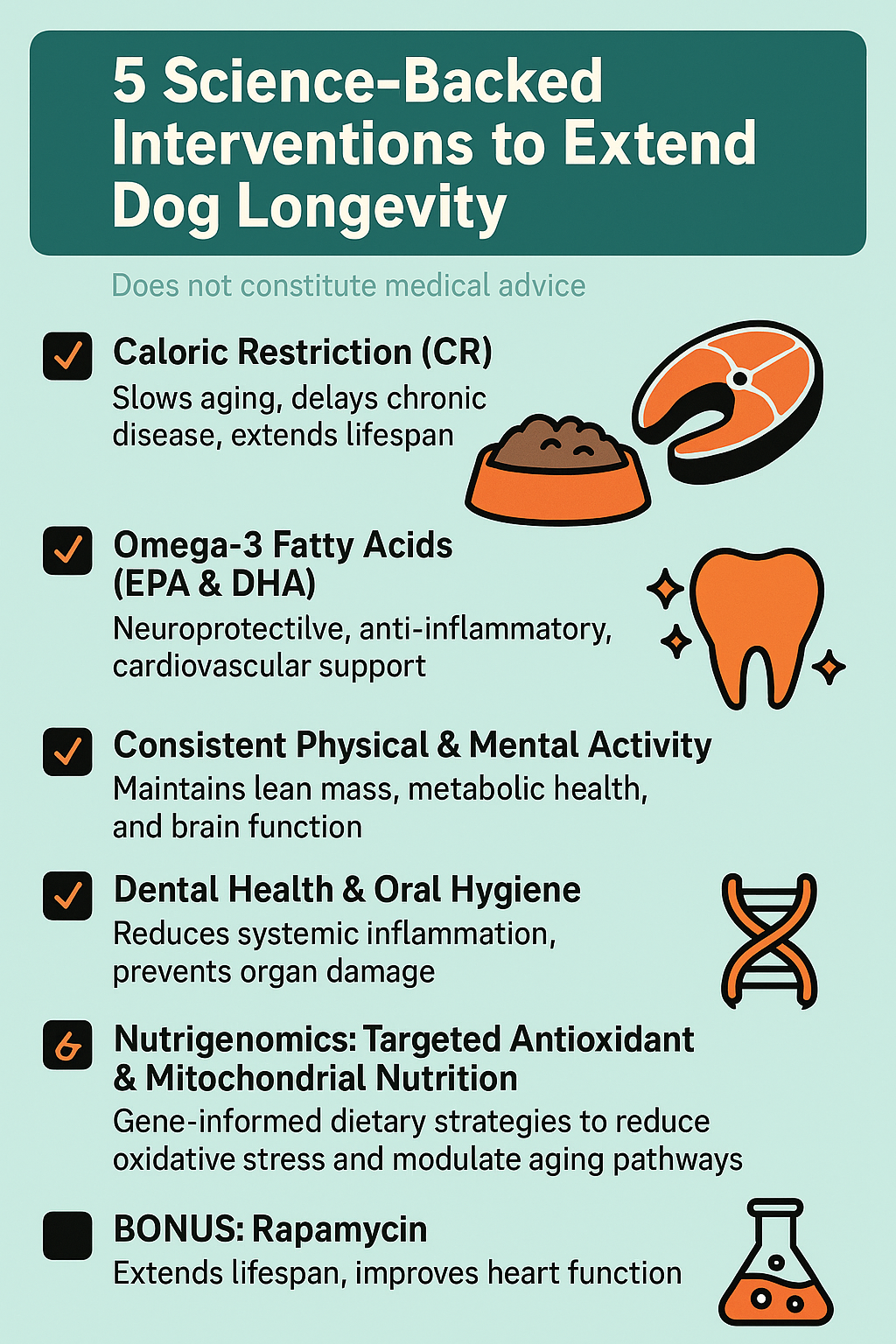Dog Longevity: 5 Science-Backed Ways to Help Your Dog Live a Longer Life
By: Dr Francis Cabana (and not AI)
If you’ve ever looked at your dog and wished they could live forever, you’re not alone. While we can’t stop time, modern science clearly shows that we have significant influence over how long—and how well—our beloved companions live.
This isn’t about marketing hype or miracle supplements. This is the real, proven formula for dog longevity: a powerful combination of biological principles, strategic feeding, and smart lifestyle choices that can truly extend your dog's lifespan.
1. Feed Less, Live More: The Power of Caloric Restriction for Dog Lifespan
The single most impactful finding in dog longevity science comes from a landmark study on Labrador Retrievers. Dogs fed a diet with 25% fewer calories than their littermates lived nearly two years longer on average.
This simple change—caloric restriction—is one of the most effective tools for extending a dog's life. The key to a longer life isn’t in the supplement aisle; it’s in the scoop size.
Why it Works: Lower calorie intake slows metabolism and dramatically reduces oxidative stress. Think of oxidative stress as cellular "rust"—by slowing it down, we slow the physical aging process.
How to Apply the Longevity Protocol:
Start once your dog reaches adulthood (around 1 year old).
Aim to feed 75% of their estimated maintenance calories.
Target a healthy Body Condition Score (BCS) of 4–5/9.
Regularly check weight and muscle mass with your vet.
2. Fuel the Brain and Heart: Essential Omega-3s for Dog Longevity
If there’s a nutritional superhero for extending your dog’s life, it’s omega-3 fatty acids (specifically EPA and DHA). These powerful nutrients are essential for reducing chronic inflammation, protecting cognitive function, and maintaining heart health.
Studies show that senior dogs on diets enriched with omega-3s exhibit better memory and learning, and they show fewer signs of age-related cognitive decline.
Longevity Dose: Aim for 50–100 mg/kg of body weight per day (EPA + DHA combined). Consult your veterinarian for the precise amount.
Best Form: High-purity fish oil or algae oil in the triglyceride form is typically preferred for better absorption.
When to Start: Introduce them in middle age (5–7 years) before decline begins.
3. Move the Body, Save the Mind: Exercise & Enrichment for a Longer Dog Life
Movement isn’t just for managing weight—it’s a powerful driver of brain health and longevity. Regular physical activity and mental stimulation improve insulin sensitivity, help preserve lean muscle mass (a key marker of long-term health), and maintain robust cognitive function.
Daily Longevity Activities:
Physical Activity: 30–60 minutes of movement like brisk walks, playing fetch, or swimming. At the very least, they need to lose their breath at least once a day.
Mental Enrichment: Rotate engaging games like puzzle feeders, structured nose-work, or hide-and-seek to keep their mind sharp.
For Seniors: Focus on consistent, low-impact fun over intense, high-impact activities.
4. Clean Teeth, Clean System: Dental Health and Systemic Longevity
Does your dog have bad breath? That odor is more than just unpleasant—it's a sign of inflammation in disguise. Periodontal disease releases bacteria and inflammatory compounds into the bloodstream, which travel to and damage vital organs like the heart, kidneys, and liver. Addressing dental health is a critical, often-overlooked step for increasing a dog's lifespan.
Your Dog Longevity Dental Protocol:
Brush Daily: Use an enzymatic dog toothpaste.
Professional Care: Schedule veterinary dental cleanings every 6–12 months as recommended by your vet.
Chew Wisely: Offer VOHC-approved dental chews like Greenies or VeggieDent to help manage plaque between cleanings.
5. Feed for the Future: Cellular Nutrition to Promote Dog Longevity
Think of this as supporting longevity at the cellular level. By strategically nourishing the mitochondria—the energy-producing engines inside your dog’s cells—you can effectively slow the aging process from the inside out. This approach is sometimes called mitochondrial nutrition or nutrigenomics - how nutrition affects genetic expression.
Key Cellular Longevity Nutrients:
L-Carnitine
Alpha-lipoic acid
CoQ10
Antioxidants (Vitamin E, C, B-complex)
These nutrients work synergistically to boost cellular energy metabolism, reduce the "rust" of oxidative stress, and help aging cells stay healthier longer.
So….
Dog longevity is not the result of good luck; it's the result of an intentional, science-based lifestyle.
You can't stop the clock entirely, but you absolutely can influence how fast it ticks. By focusing on smart caloric restriction, powerful omega-3s, consistent activity, and robust cellular health, you are actively choosing a longer, happier life for your best friend.
If you want to learn how to optimize your own pet’s diet, take a look at our coaching program here to be the kind of pawrent that doesn’t settle for “good enough”.
References
Check out more information about preventing bloat in dogs!
Scarlett, J.M. & Donoghue, S. (1998). J Am Vet Med Assoc, 212(11), 1725–1731.
O’Neill, D.G. et al. (2015). J Feline Med Surg, 17(2), 125–133.
Jacob, F. et al. (2002). J Am Vet Med Assoc, 220(8), 1163–1170.
Buffington, C.A.T. (2002). J Am Vet Med Assoc, 220(7), 994–1002.
Hall, J.A. et al. (2000). Vet Immunol Immunopathol, 74(1–2), 1–13.


